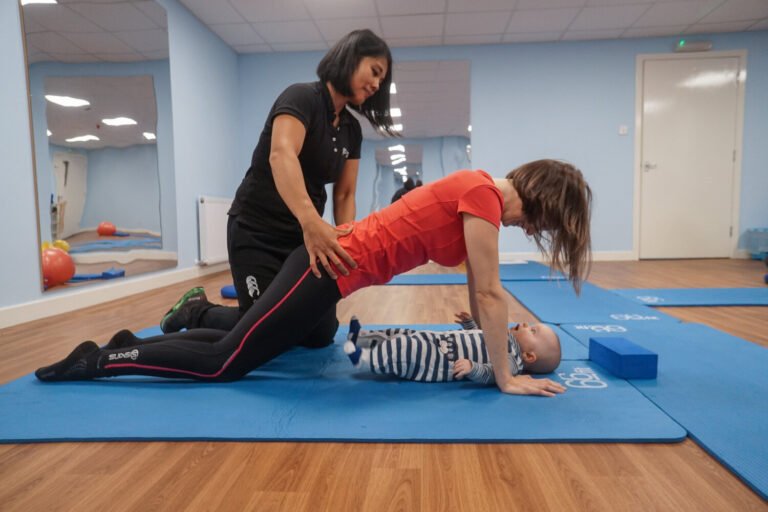Women's Physiotherapy: From Pregnancy to Menopause
Women’s bodies undergo significant changes throughout different life stages, from pregnancy to menopause. Each phase presents unique challenges and needs for care, particularly concerning physical health. Women’s physiotherapy is designed to address these specific needs, helping women maintain optimal health and well-being at every stage. In this article, we will explore the benefits of women’s physiotherapy from pregnancy through menopause and provide valuable insights into how it can support women through these transitions.
Women's Physiotherapy During Pregnancy
Pregnancy is a time of profound physical and hormonal changes. Women’s physiotherapy during pregnancy focuses on preparing the body for childbirth and managing common pregnancy-related issues.
Benefits of Physiotherapy During Pregnancy
- Pain Management: Physiotherapy can help alleviate common pregnancy-related pains such as lower back pain, pelvic girdle pain, and sciatica.
- Improved Posture: Exercises and posture training can help manage the shifting center of gravity and prevent postural issues.
- Strengthening Pelvic Floor Muscles: Strengthening these muscles can aid in childbirth and reduce the risk of incontinence.
- Preparation for Labor: Specific exercises and breathing techniques can help prepare the body for labor and delivery.
Recommended Exercises
- Pelvic Tilts: Helps reduce back pain and strengthen abdominal muscles.
- Kegel Exercises: Strengthens pelvic floor muscles.
- Gentle Stretching: Helps maintain flexibility and reduce muscle tension.
Women's Physiotherapy Postpartum
The postpartum period is crucial for recovery and restoring physical health. Women’s physiotherapy can aid in healing and rebuilding strength.
Benefits of Postpartum Physiotherapy
- Pelvic Floor Recovery: Exercises to strengthen the pelvic floor and prevent issues such as incontinence and prolapse.
- Abdominal Muscle Repair: Guidance on exercises to address diastasis recti (separation of abdominal muscles).
- Pain Relief: Techniques to manage postpartum pain, including back pain and pelvic discomfort.
- Postural Correction: Advice on maintaining good posture while caring for a newborn.
Recommended Exercises
- Kegel Exercises: Continues to strengthen pelvic floor muscles.
- Abdominal Exercises: Focuses on safely rebuilding core strength.
- Gentle Cardio: Walking or low-impact activities to promote overall fitness.
Women's Physiotherapy During Menopause
Menopause brings a new set of challenges, including hormonal changes, weight gain, and joint pain. Women’s physiotherapy can help manage these symptoms and maintain a healthy lifestyle.
Benefits of Physiotherapy During Menopause
- Bone Health: Weight-bearing exercises to strengthen bones and prevent osteoporosis.
- Joint Pain Relief: Techniques to manage arthritis and other joint-related issues.
- Pelvic Health: Continues support for pelvic floor muscles to prevent incontinence.
- Weight Management: Exercise programs to help manage weight and improve cardiovascular health.
Recommended Exercises
- Strength Training: To maintain muscle mass and bone density.
- Low-Impact Cardio: Such as walking, swimming, or cycling.
- Yoga and Stretching: To improve flexibility and reduce joint stiffness.

Conclusion
Women’s physiotherapy is an invaluable resource for managing the physical changes and challenges women face from pregnancy to menopause. By addressing specific needs at each life stage, women’s physiotherapy helps maintain optimal health, reduce pain, and improve overall quality of life. Whether you’re preparing for childbirth, recovering postpartum, or navigating menopause, incorporating physiotherapy into your routine can offer significant benefits. Remember to consult with a qualified physiotherapist to develop a personalized plan that suits your unique needs.
FAQs
1. What is women’s physiotherapy?
Women’s physiotherapy is a specialized branch of physiotherapy focusing on conditions affecting women throughout different life stages, including pregnancy, postpartum, and menopause.
2. Can physiotherapy help with pregnancy-related pain?
Yes, physiotherapy can effectively manage and alleviate pregnancy-related pain, including lower back pain, pelvic girdle pain, and sciatica.
3. How soon after childbirth can I start postpartum physiotherapy?
You can typically start postpartum physiotherapy as soon as your healthcare provider gives you the green light, often around six weeks after delivery.
4. Is physiotherapy beneficial during menopause?
Yes, physiotherapy can help manage menopausal symptoms such as joint pain, weight gain, and bone health issues.
5. How often should I see a women’s physiotherapist?
The frequency of visits depends on your individual needs and the specific phase of life you’re in. Your physiotherapist will recommend a suitable schedule.
6. Can physiotherapy help with diastasis recti?
Yes, women’s physiotherapy can provide specific exercises to help close the gap caused by diastasis recti and strengthen the abdominal muscles.
7. What are pelvic floor exercises, and why are they important?
Pelvic floor exercises, such as Kegels, involve contracting and relaxing the pelvic floor muscles. They are crucial for maintaining bladder and bowel control and supporting pelvic organs.
8. Is women’s physiotherapy covered by insurance?
Coverage for women’s physiotherapy varies depending on your insurance plan. It’s best to check with your provider to understand your coverage.
9. Can I do physiotherapy exercises at home?
Yes, many physiotherapy exercises can be performed at home. However, it’s advisable to consult a physiotherapist to ensure you’re doing them correctly and safely.
10. How can I find a qualified women’s physiotherapist?
You can find a qualified women’s physiotherapist by asking for recommendations from your healthcare provider, searching online directories, or contacting local physiotherapy clinics.
DON’T FORGET TO VISIT!


